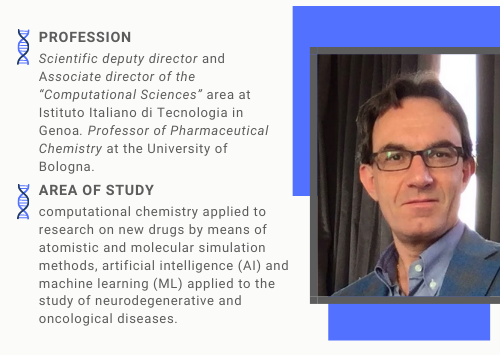Andrea Cavalli Interview

What is your role at 5000genomi@VdA?
In the 5000genomi@VdA project, I will be involved principally in part of the mathematical, machine learning and bioinformatics analysis of the data produced by patient DNA sequencing, the subject that in technical parlance is called “computational genomics”.
Who is involved in your research group, and which pathologies will you be focusing on?
My team and I, working in close contact with the other two technology partners in the project, the Osservatorio Astronomico della Regione Autonoma Valle d’Aosta (OAVdA) and the company ENGINEERING D.HUB., will be working on the “post-genomic” phase of research, using complete and “raw” DNA sequencing data and the digitalised clinical records collected by means of work performed by the team of physicians from the local health authorities (AUSL VdA) and the biologists/biotechnologists in Prof. Gustincich’s group. My team will be cross-functional, comprising experts in bioinformatics, engineering, mathematics and physics, working alongside some of the young scholarship researchers who began this adventure with us on 1 July 2020. As regards the diseases studied, in the research phase we will focus principally on pancreatic cancers.
How will you be able to perform this complex data analysis?
In consideration of the project’s high technological value, the construction of the infrastructure hosting the research activities, instrumentation and computers will be of prime importance: it will constitute the core of CMP3VdA, based in the Espace Aosta Area, which will be opened, in the best-case scenario, early in 2021. At the same time, the biobank will be installed at the Parini Hospital, and the trained staff necessary for running the activities and research processes will be recruited, including 21 young scientists who have chosen the project and the Aosta Valley as an opportunity for developing their skills and career. It is obvious that none of this could be achieved without the contribution and cooperation of healthcare specialists, scientists and technicians, with the assistance of local partners.
What are the computational genomics team’s principal objectives?
My team will be involved mainly in the bioinformatics and mathematical analysis and interpretation of data, using advanced computing tools specially designed to process high quantities of information by means of HPCs, “high performing computers” capable of running 1015 operations per second, and artificial intelligence (AI), applying machine learning technology to health data. The aim is to divide patients into groups according to the typology of disease and their individual characteristics, for better access to personalised medicine processes.
What impact will your research have?
The combination of the analysis of genomic data will enable us, along with medical staff, to create the prototype of the “medical records of the future” which will comprise both clinical information and the results of “traditional” diagnostic tests, and the information based on DNA sequencing with annotations regarding any existing mutations. This will be an important step in improving patient diagnosis and treatment, a high-quality service for healthcare professions, and a source of new horizons for scientific research. This work will also have an impact on costs, with the objective of reducing timescales and improving the precision of diagnoses.
What is the meaning of “healthcare 4.0” and “hospital genomisation”?
Healthcare 4.0, a subject that is attracting more and more attention in recent years, consists of the standardised use of patient data in order to improve diagnostics and clinical-therapeutic processes by means of the progressive digitalisation of the health system. As regards the concept of “hospital genomisation”, this refers to the inclusion of DNA analysis results in patients’ healthcare records, so that the information is made available for all possible future medical applications. In this way, different healthcare specialists will no longer have to request identical analyses, thus reducing wasted time and resources.
(interview: Sept 2020)




